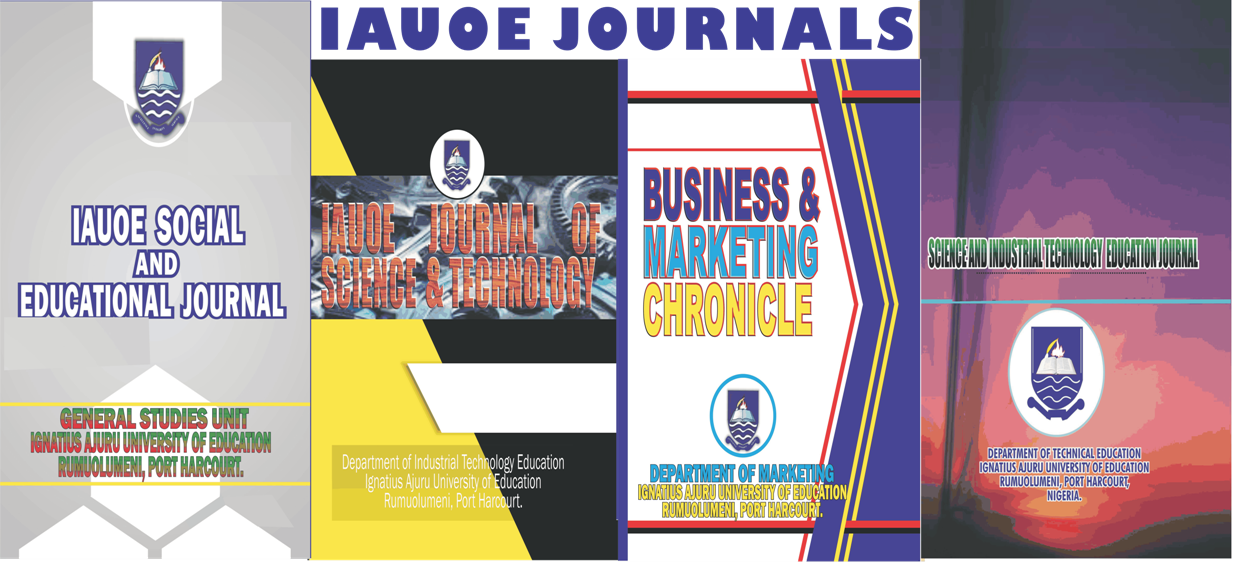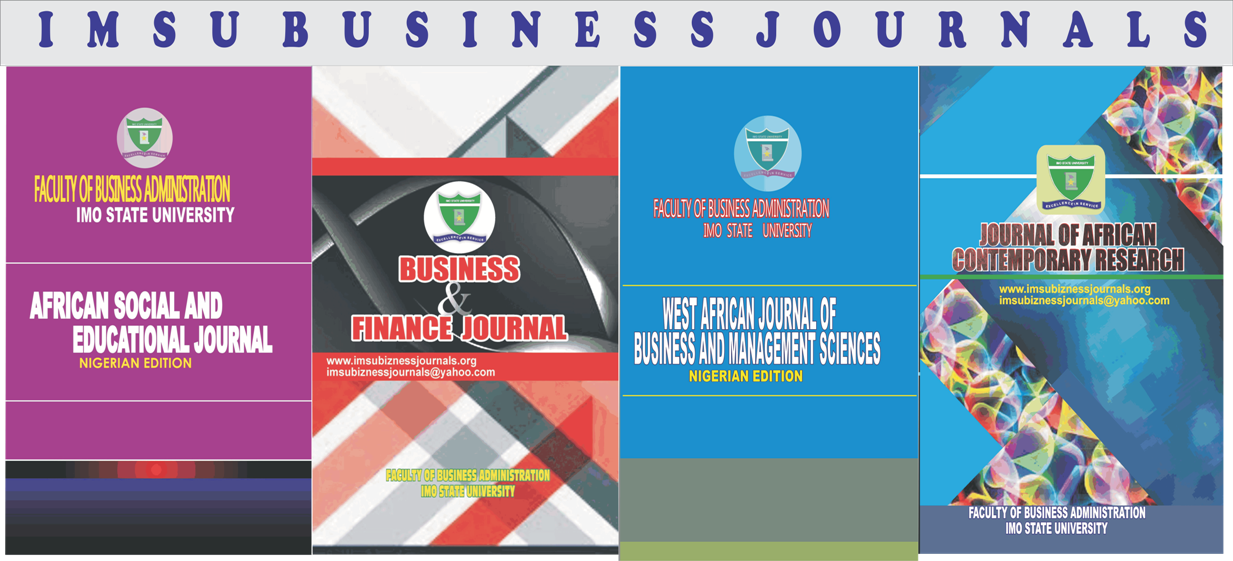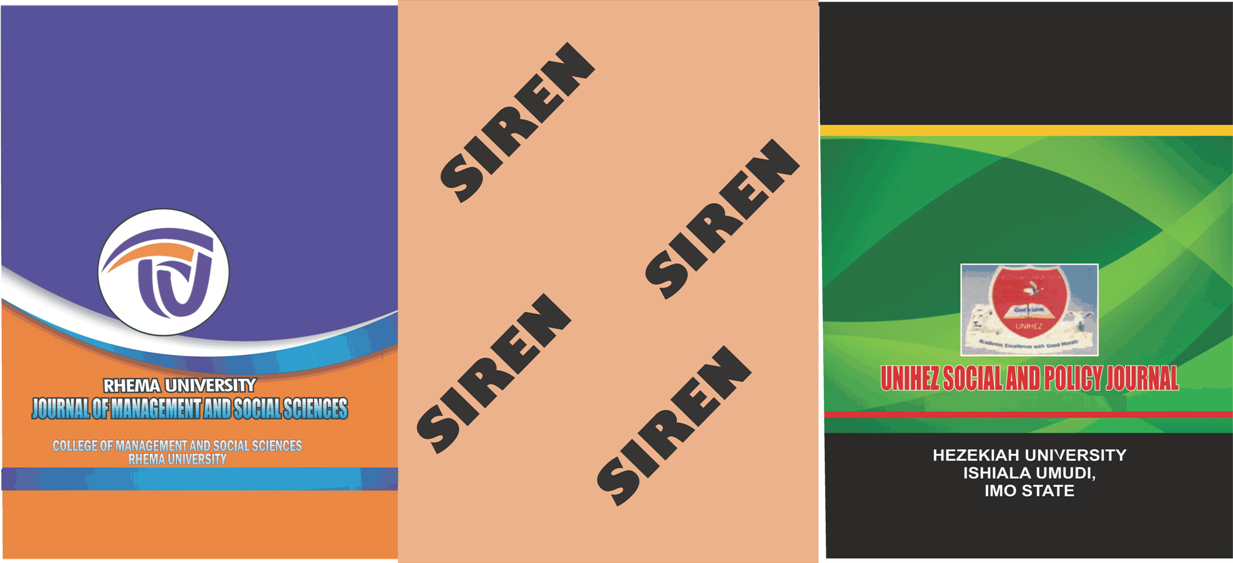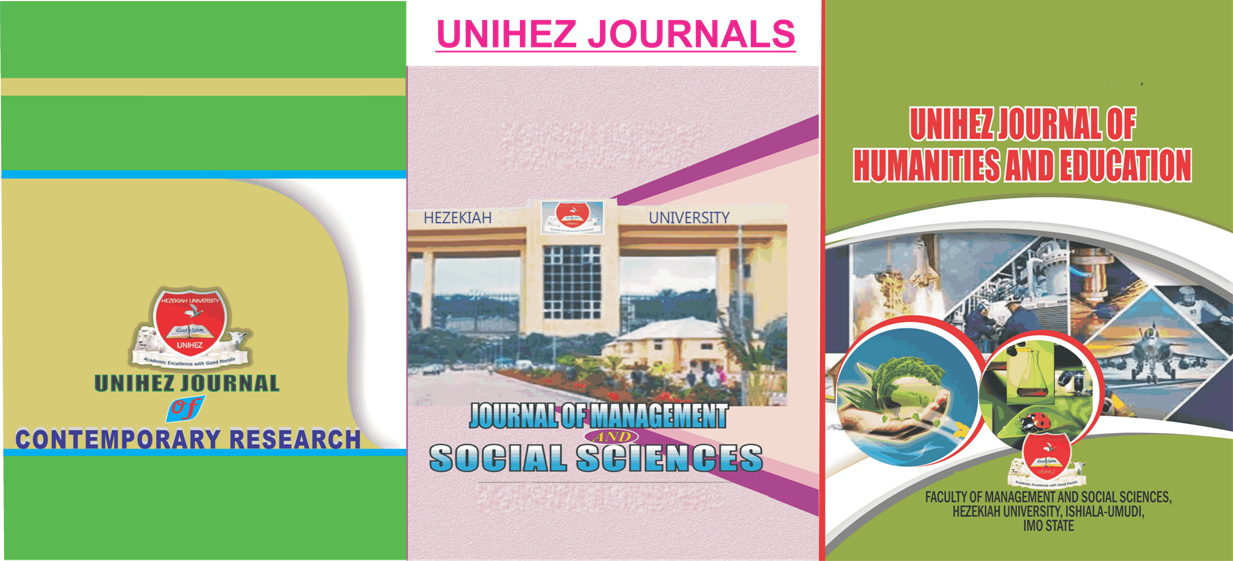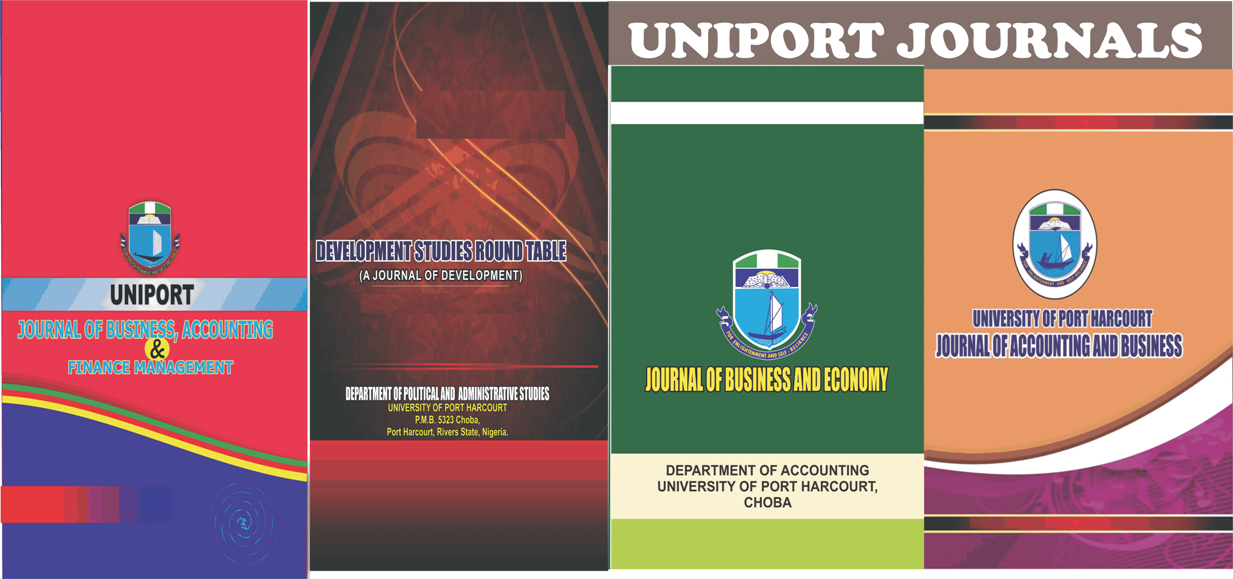2021 Archive
| 1 |
Title: IMPACT OF PARTICIPATORY DECISION MAKING APPROACH ON ENTREPRENEURIAL PERFORMANCE IN NIGERIA.pdf Author: Ujadughele Kenneth & B.C Onouha PhD. Abstract: Abstract This study investigated the impact of participatory decision making on the entrepreneurial performance of some selected agencies in Nigeria, in this study, job creation, economic growth and poverty reduction were factors used to capture entrepreneurial performance as dependent factor while participatory decision making was used as independent factor. The study employed a mixed-method design, thereby using both primary and secondary sourced data. The primary data were sourced from structured questionnaires administered to a sample of 278 management staff of 9 specifically selected federal agencies using, while the secondary data was gotten from CBN report and World Bank yearly report. The study used via MAXQDA, Statistical Package for Social sciences SPSS version 10 and AMOS for date analysis, The results of regression analysis revealed that participatory decision making positively affected all dimensions of entrepreneurial performance, the study therefore recommends that; Public agencies should actively strive to get representative from the sub-sectors who are an active participant in the labour market (and currently observed to be misrepresented based on poor job creation antics and the rising rate of unemployment) and derive useful information to enable the government meet with the need of entrepreneurs towards ensuring provision for jobs and by so doing improve economic growth and reduce poverty. View |
| 2 |
Title: ASSESSING THE INFLUENCE OF DESTINATION IMAGE ON TRIP BEHAVIOUR IN SELECTED TOURISTIC CENTRES IN OWERRI, IMO STATE.pdf Author: Anyanwu, I. B. PhD. & Jonathan-Itua, F. Abstract: Abstract This study sought to determine the influence of destination image on trip behaviour in selected touristic centres in Owerri, Imo State. Five research hypotheses guided the study. The study population comprised all visitors and tourists that visited the study area during the period of the study (October-December 2019) and it is an infinite population. The sample size of 200 was purposively determined. The research instrument for data collection was subjected to reliability test using Crombach Alpha reliability technique and a reliability co-efficient of 0.79 was obtained. Convenient sampling technique was used for the study and simple regression analytical tool was used in analysing the data generated on SPSS version 25 package. Findings revealed that a significant relationship exists between destination image, and motivation (0.632); past experience (0.456); price (0.921); and service quality (0.781) at 0.05% level of significance, while the relationship between destination image and attitude (0.212) was found not to be significant at 0.05% level of significance. It was therefore concluded that destination image has significant influence on trip behaviour in the study area. In view of the findings, it was recommended among others that operators of these centres should do more in motivating potential visitors/tourists through continuous improvement in facilities and features to induce positive trip behaviour, that the tangibles should be such that guarantee a feel of pleasant and memorable experience such that can develop in the visitors/tourists the organic image of the destination, and that the tariff structure of the centres should be made to reflect the quality inherent in the services rendered. Key: Destination, Image, Trip, Behaviour, Touristic centres. View |
| 3 |
Title: TRADE OPENNESS, FINANCIAL OPENNESS AND FINANCIAL DEVELOPMENT EVIDENCE FROM SUB SAHARAN AFRICAN COUNTRIES.pdf Author: Damola A. Odewale & Emeka J. Okereke PhD. Abstract: Abstract This study seeks to empirically appraise the association between trade openness, financial openness, and financial development in some sub-saharan African countries over the time period of 2000 to 2017, utilizing proxies such as Total Export ratio to Gross Domestic Product, ratio of Broad Money Supply to Gross Domestic Product, and Private Sector Credit to Gross Domestic Product to achieve the objectives of the study, the panel data analysis technique, unit root test and other diagnostic tests were employed. Empirical results show that there exists some form of relationship among the selected variables. The major interference of this research is that selected trade openness activities underperformed in influencing the macroecomic performance as captured by in sub-saharan African countries within the reviewed period, showing a prevalence of uncurtail parallel market activities and the significant level of dependency. The study recommends that diversification is needed in the economy as there still exist a level of dependency on( the crude-oil like the case of Nigeria)so as to cushion the shocks associated with such in the world market, and export sectors must be revitalized to reposition the sub-saharan African countries strength in export activities. Key Words: Broad Money Supply, Private Sector Credit, Total Export, and Gross Domestic Product. View |
| 4 |
Title: CONSENSUS BASED DECISION MAKING APPROACH AND ENTREPRENEURIAL PERFORMANCE IN NIGERIA.pdf Author: Ujadughele Kenneth & E. Amah Abstract: Abstract This study examine the relationship between consensus-based decision making approach and entrepreneurial performance of federal government agencies in Nigeria, Entrepreneurial performance was captured using job creation, economic growth and poverty reduction as dependent variables while Decision-making approach was covered using consensus-based decision making as independent factor. The study used mixed-method design, thereby using both primary and secondary sourced data. The primary data were sourced from structured questionnaires administered to a sample of 278 management staff of 9 specifically selected federal agencies using, while the secondary data was gotten from CBN report and World Bank yearly report. The study used via MAXQDA for correlation analysis, Statistical Package for Social sciences SPSS version 10 for descriptive analysis and AMOS is used hypothesis testing. The results of regression analysis revealed that consensus decision making positively affected all dimensions of entrepreneurial performance, the study therefore recommends that; Nigerian Federal Agencies need to increase their capacity to change and amend their activities to ensure elimination of poverty and strengthened Nigeria economy using consensus-based decision-making. Nigerian Federal Agencies need to accept and incorporate consensus decision making approach because it has empirical shown to be better decision-making between managers and employees and managers and co-managers in keeping with enhancing entrepreneurial performance through poverty reduction, job creation and economic growth in Nigeria. View |
| 5 |
Title: EFFECT OF INTERNATIONAL PUBLIC SECTOR ACCOUNTING STANDARD (IPSAS) ON FINANCIAL REPORT COMPARABILITY, RELEVANCE AND TIMELINESS A STUDY OF KANO STATE.pdf Author: College, E. Ogodogun., Emmanuel, I. Okoye PhD. & Ugochukwu, J. Nwoye PhD. Abstract: Abstract This study was carried out to assess the outcome of International Public Sector Accounting Standard (IPSAS) on financial reporting quality in Kano state. In executing the study, the Ex-post Facto research design was used. This involved the examination of financial reports of Kano state for the period 2016 - 2020. Data were collected through content analysis, while data analysis was done using the SPSS Correlation Analysis on the variables of comparability, relevance and timeliness. The statistical tool of SPSS Linear Regression technique was employed to test the formulated hypotheses. Findings revealed that the financial statements of Kano state show qualitative characteristics of comparability, relevance and timeliness after the implementation of International Public Sector Accounting Standards accrual basis. The implication of the findings is that, the financial reports of Kano state might have remained incomparable, irrelevance and untimed, if IPSAS was not implemented. It is therefore recommended that, other States that are yet to implement the IPSAS accrual reform should do so in order to make their financial reports to be comparable, relevant and published timely. Keywords: IPSAS, Relevance, timeliness, comparability, financial reporting, decision making. View |
| 6 |
Title: CREATIVE THINKING AND ENTREPRENEURIAL INNOVATIVENESS OF SELECTED SMALL AND MEDIUM ENTERPRISES (SMEs) IN RIVERS STATE, NIGERIA.pdf Author: John, E. Chikwe, PhD. & Ibekwe Wechie Abstract: Abstract The study philosophically and empirically examined if creative thinking relates to entrepreneurial innovativeness of small and medium enterprises in Rivers State, Nigeria. Creative thinking is involved in recognizing, remembering, reasoning, inventing, emoting, imagining, and decision making, and these enhance entrepreneurial innovativeness and innovations. Creativity forms the barometer for measuring how innovative an entrepreneur should be that will enhance innovativeness, innovation and competitive advantages achievements. Creativity is the battle ground for competitive firms. Cross-sectional survey and Likert 5-point scale measure structured questionnaire were adopted. 50 small and medium enterprises were statistically selected from 10 industries in Rivers State. Based on the 50 enterprises, the entrepreneur and assistant in each enterprise were purposively selected to arrive at 100 respondents, constituting the sample size. After data cleaning, 92 copies of questionnaire were used in the analysis. Multiple regression and Pearson’s correlation statistical techniques at 0.05 level of significance were adopted in the analysis, with the aid of Statistical Package for Social Science. Strong positive and significant relationship exists between the study predictor and criterion variables. Entrepreneurs should not be locked up in the old ways of doing business, but to adopt creative thinking in line with the business environment dynamism and comparative competitiveness in the marketplace, was recommended amongst others. Key words: Creative Thinking; Critical Thinking; Knowledge Management; Entrepreneurial Innovativeness; Innovations; SMEs. View |
| 7 |
Title: CAPITAL ADEQUACY AND BANK’S PERFORMANCE EVIDENCE FROM SELECTED FIRST TIER BANKS NIGERIA.pdf Author: Oyetayo, Oluwatosin Juliana., Osinubi, Tokunbo Simbowale & Amaghionyeodiwe, Lloyd Abstract: Abstract Banks role in the economic growth and development of an economy cannot be underestimated. Though this role is significantly through the financial system, capital adequacy, measured by the capital - asset ratio, is a germane factor in examining the operational efficiencies of banks. This study thus, investigated the effect of capital adequacy on bank performance in Nigeria. Primary based secondary data from selected banks was used for the study. Unit Root Test and Pooled Panel Least Squares Estimation as well as the Breuch Godfrey rest were carried out in the study. The study findings, among others, showed that capital adequacy had a positive and significant effect on the banks performance while liquidity has a negative and significant relationship with the performance of the selected banks implying that our result conforms to the trade-off principle that describes the liquidity and profitability relationship. Also, deposit has a negative and relationship with bank performance even though it is expected to be positive. The study thus suggested that the Central Bank of Nigeria (CBN) should pay attention to the cost incurred by banks on deposits maintained with them as this may have significant implications on the banks’ capital and performance in general. Keywords: Capital Adequacy, Economic Growth, Bank Performance, Liquidity, Profitability, Nigeria. View |
| 8 |
Title: Author: Ojukwu, Chioma Obianuju., Ibanichuka, Emmanuel A. L. PhD. & Egbe, Solomon PhD. Abstract: Abstract This study examined the impact of external debt on economic development in Nigeria from 1970-2019 (50 Years) using secondary data from Central Bank of Nigeria (CBN), Debt Management Office of Nigeria (DMO), and the World Bank. GDP per Capita (GDPpC) and Primary School Enrolment (PSE) were used to measure the endogenous variable economic development while external debt was the exogenous variable. Debt overhang theory is the key theory upon which this study is hinged. Data analysis was done using Unit Root Test, Johansen Co-integration, Vector Error Correction Model and Granger Causality test. This study revealed that in Nigeria, external debt has a positive and an insignificantly effect on GDP per Capita. Furthermore, external debt has a negative and an insignificant effect on primary school enrolment. Hence, concludes that External debt has a negative and insignificant effect on economic development in Nigeria. It, recommends that Government should reduce borrowing externally and engage the external creditors in debt forgiveness and possibly plead for outright cancellation of some of these debts. Furthermore, the researchers recommend the cutting down of the cost of governance in Nigeria in order to reduce the pressure to always support the expenses in the annual budgets with external borrowings. Keywords: External debt, Economic development, GDP per Capita, Primary School Enrollment and Debt Overhang Theory. View |
| 9 |
Title: RISK MANAGEMENT AND CORPORATE ORGANIZATIONAL PERFORMANCE IN THE FINANCIAL INSTITUTE.pdf Author: Akpanabia, Nsisuk H. PhD. & Ozims Ekwutosi PhD. Abstract: Abstract This study focused on risk management and corporate organizational performance in the financial institute. To ensure that the researcher was properly guided, two research questions were raised and one hypothesis was tested. The data used in the study were generated mainly through questionnaire administered on the respondents. Simple percentage (%) and chi-square (X2) was the instrument of data analysis. From the analyses of the data gathered, the researcher discovered the credit risk management can lead to high profitability of banks, and its patronage. It was concluded that the risks faced by banks are endogenous, associated with the nature of banking business itself, whilst others are exogenous to the banking system. View |
| 10 |
Title: DOMESTIC DEBT AND PRIMARY SCHOOL ENROLMENT IN NIGERIA.pdf Author: Ojukwu, Chioma Obianuju., Ibanichuka, Emmanuel A. L. PhD. & Egbe, Solomon PhD. Abstract: Abstract The study empirically analysed Domestic Debt and Primary School Enrolment in Nigeria. The study obtained secondary data from the World Bank, Debt Management Office of Nigeria (DMO) and Central Bank of Nigeria (CBN) for a period covering 1970-2019 using Unit Root Test (URT), Johansen Co-integration Test (JCT), Vector Error Correction Model (VECM) and Granger Causality Test (GCT) for the data analysis. The major theory that supports the study is Keynesian Theory on Public Debt. The VECM result found that domestic debt showed a positive coefficient of 0.10495 alongside a significant P-value of 0.0076, hence, revealing that domestic debt has a positive and significant effect on primary school enrolment (PSE) in Nigeria. It concludes that borrowing internally has greatly improved primary school enrollment in Nigeria over this 50-year period. Therefore, recommends that judicious utilization of domestic debt should be continued in Nigeria by all the domestic debt managers especially in the area of education as it affirms to have boosted basic education within the period under study. More so, diversification of the economy to boom in order to have alternative revenue-generating capabilities in the economy other than domestic borrowings and a private sector-driven economy should also be encouraged. Keywords: Domestic debt, Primary School Enrollment, Keynesian Theory on Public Debt and Nigeria. View |
| 11 |
Title: CONCENTRIC GROWTH STRATEGY AND CORPORATE AGILITY IN DEPOSIT MONEY BANKS IN PORT HARCOURT.pdf Author: Green Soprinye Dublin & Umoh, G. I. PhD. Abstract: Abstract This research work examines the association between strategic growth options and corporate agility amongst banks in Port Harcourt. The study was conducted at the group macro-level of analysis and group unit of analysis, and drew its research data from a population of 49 departments drawn from 8 money deposit banks in Port Harcourt. The major data collection instrument was questionnaire supported with scheduled interviews. The data collected were analyzed using Descriptive (Univariate) and inferentially (Bivariate and Multivariate). Inferentially, the research hypotheses were tested using Spearman’s Rank Order Correlations Coefficient. Drawings from the test results and discussions, the study found that such growth strategies as Concentric, Integrative and Diversifications, directly increase the sustenance of corporate banks robustness and agility. Thus, the study concluded that corporate resilience of money deposit banks is a function of the effective implementation of growth strategies. The study therefore recommended that banks should maintain constant growth consciousness to sustain their desired resilience. View |
| 12 |
Title: IMPACT OF CRISIS MANAGEMENT ON THE PERFORMANCE OF MINISTRY OF TRANSPORT ABIA STATE.pdf Author: Uche Deborah Kelechi-Nwamuo PhD., Aniuga, Chukwuma PhD. & Emereole Ibemelam Daniel Abstract: Abstract This study focused on the impact of crisis management on the performance of ministry of transport Abia State. This study employed a survey design. This study adopted both primary and secondary data. The target population consists of two hundred and forty-one (241) employees of every department in the Ministry of Transport in Abia State. Thus, the sample size of 150 respondents was derived from Taro Yamane formula. A stratified sampling method was adopted and it gave the staff an equal chance of being selected. Regression model was used to test the dependent and independents variable. The study found out that Crisis planning has a significance effect on organizational effectiveness of Ministry of Transport Abia State, Nigeria. The study concluded that crisis communication has a significance impact on organizational output of Ministry of Transport Abia State, Nigeria. The study recommended that management must not only believe in the value of crisis planning, they need to understand the components of effective crisis planning and implement those components in their organizations. Keywords: Crisis Management, Crisis Planning, Crisis Communication and Performance View |
